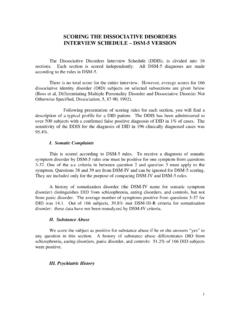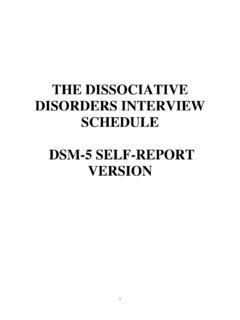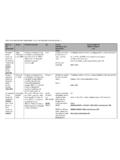Transcription of THE DISSOCIATIVE DISORDERS INTERVIEW …
1 1 THE DISSOCIATIVE DISORDERS INTERVIEW schedule - DSM-5 VERSION The DISSOCIATIVE DISORDERS INTERVIEW schedule (DDIS) is a highly structured INTERVIEW that makes DSM-5 diagnoses of somatic symptom disorder, borderline personality disorder and major depressive disorder, as well as all the DISSOCIATIVE DISORDERS . It inquires about positive symptoms of schizophrenia, secondary features of DID, extrasensory experiences, substance abuse and other items relevant to the DISSOCIATIVE DISORDERS . The DDIS can usually be administered in 30-45 minutes.
2 Permission to copy and distribute is granted by Colin A. Ross, 2 CONSENT FORM FOR THE DISSOCIATIVE DISORDERS INTERVIEW schedule I agree to be interviewed as part of a research project on DISSOCIATIVE DISORDERS . DISSOCIATIVE DISORDERS involve problems with memory. I understand that the INTERVIEW contains some personal questions about my sexual and psychological history, however, all information that I give will be kept confidential. My name will not appear on the research questionnaire. I understand that my answers will have no direct effect on how I am treated in the future.
3 I understand that the overall results of this research will be published and these results will be available to authorities or therapists involved with me. I understand that the interviewer and other researchers cannot offer me treatment. I understand that the purpose of this INTERVIEW is for research and that I cannot expect any direct benefit to myself other than knowing that I have helped the researchers understand DISSOCIATIVE DISORDERS better. I agree to answer the interviewer s questions as well as I can but I know that I am free not to answer any particular questions I do not want to answer.
4 Although I have signed my name to this form, I know that it will be kept separate from my answers and that my answers cannot be connected to my name, except by the interviewer and his/her research colleagues. I also understand that I may be asked to participate in further DISSOCIATIVE DISORDERS interviews in the future, but that I will be free to say no. If I do say no this will have no consequences for me and any authorities or therapists involved with me will not be told of my decision not to be interviewed again.
5 Signed: _____ Witness: _____ Date: _____ 3 DEMOGRAPHIC DATA FOR DISSOCIATIVE DISORDERS INTERVIEW schedule Age: [ ] Sex: Male=1 Female=2 [ ] Marital Single=1 Married (including common-law)=2 Status: Separated/Divorced=3 Widowed=4 [ ] Number of Children: (If no children, score 0) [ ] Occupational Status: Employed=1 Unemployed=2 [ ] Have you been in jail in the past? Yes=1 No=2 Unsure=3 [ ] Physical diagnoses currently active: [ ] [ ] [ ] Current and past diagnoses must consist of written diagnoses provided by the referring physician or available in the patient s chart (give DSM-5 codes if possible, if not write DSM-5 diagnoses to the right of the brackets).
6 Psychiatric diagnoses currently active: [ ] [ ] [ ] Psychiatric diagnoses currently in remission: [ ] [ ] 4 DISSOCIATIVE DISORDERS INTERVIEW schedule DSM-5 VERSION Questions in the DISSOCIATIVE DISORDERS INTERVIEW schedule must be asked in the order they occur in the schedule . All the items in the schedule , including all the items in the DSM-5 diagnostic criteria for DISSOCIATIVE DISORDERS , somatic symptom disorder, and borderline personality disorder must be inquired about. The wording of the questions should be exactly as written in order to standardize the information gathered by different interviewers.
7 The interviewer should not read the section headings aloud. The interviewer should open the INTERVIEW by thanking the subject for his/her participation and then should say: Most of the questions I will ask can be answered Yes, No or Unsure. A few of the questions have different answers and I will explain those as we go along. 1. Somatic Complaints 1. Do you suffer from headaches? Yes=1 No=2 Unsure=3 [ ] If subject answered No to question 1, go to question 3: 2. Have you been told by a doctor that you have migraine headaches?
8 Yes=1 No=2 Unsure=3 [ ] Interviewer should read the following to the subject: I am going to ask you about a series of physical symptoms now. To count a symptom as present and to answer yes to these questions, one or more of the following must be met: a) you have disproportionate or persistent thoughts about the seriousness of the symptom. b) you have a persistently high level of anxiety about health or the symptom. c) you devote excessive time and energy to the symptom or health concern. Interviewer should now ask the subject, Have you ever had the following physical symptoms?
9 The interviewer should review criteria a-c for the subject immediately following the first positive response to ensure that the subject has understood. 3. Abdominal pain (other than when menstruating) Yes=1 No=2 Unsure=3 [ ] 5 4. Nausea (other than motion sickness) Yes=1 No=2 Unsure=3 [ ] 5. Vomiting (other than motion sickness) Yes=1 No=2 Unsure=3 [ ] 6. Bloating (gassy) Yes=1 No=2 Unsure=3 [ ] 7. Diarrhea Yes=1 No=2 Unsure=3 [ ] 8. Intolerance of (gets sick on) several different foods Yes=1 No=2 Unsure=3 [ ] 9.
10 Back pain Yes=1 No=2 Unsure=3 [ ] 10. Joint pain Yes=1 No=2 Unsure=3 [ ] 11. Pain in extremities (the hands and feet) Yes=1 No=2 Unsure=3 [ ] 12. Pain in genitals other than during intercourse Yes=1 No=2 Unsure=3 [ ] 13. Pain during urination Yes=1 No=2 Unsure=3 [ ] 14. Other pain (other than headaches) Yes=1 No=2 Unsure=3 [ ] 15. Shortness of breath when not exerting oneself Yes=1 No=2 Unsure=3 [ ] 16.



